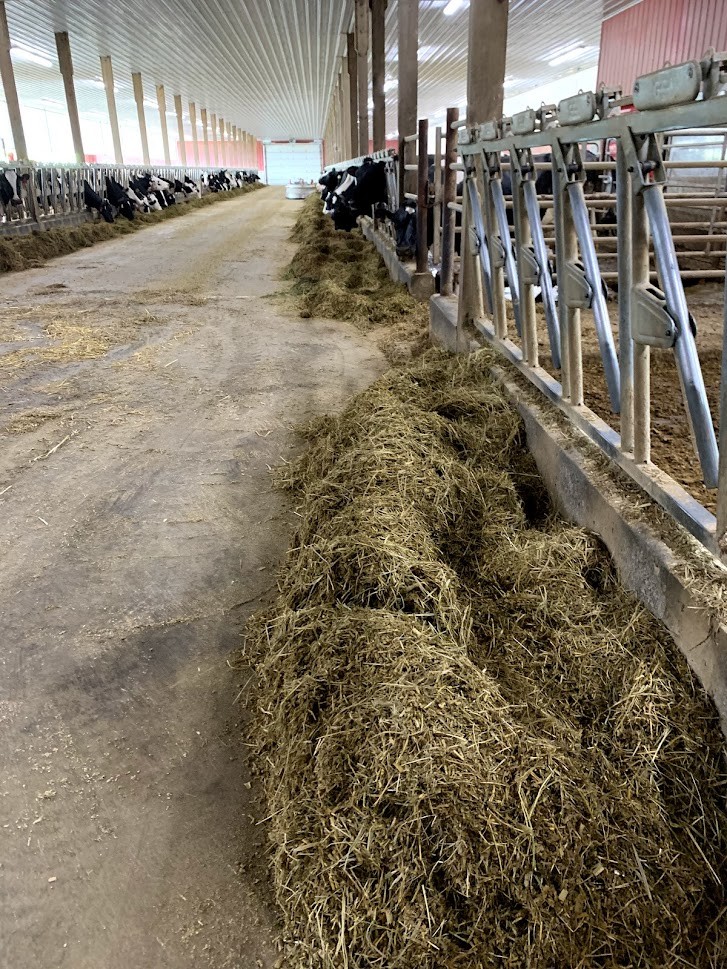Make room for transition cows by Katelyn Allen - Hoard's Dairyman
Make room for transition cows by Katelyn Allen - Hoard's Dairyman (access the original article by clicking here)
Everything a dairy wants to see happen in their transition cows, from avoiding disease to efficiently contributing to the herd, can be influenced by dry cow and fresh cow housing and management, said Lindsay Ferlito in a Cornell University Transition Cow Tuesday presentation.
A large, well-bedded lying surface was at the top of Ferlito's list, and she recommended at least 100 square feet per cow in a bedded pack barn. To further ensure these cows have enough room, aim to keep the stocking density below 100% in prefresh as well as fresh pens. The Cornell Cooperative Extension regional dairy specialist said that 80% stocking is ideal, but she recognized that is not always practical.
A number to keep in mind when setting up or building maternity pens is your average number of calvings each month. Ferlito's advice is to have pens large enough to accommodate 140% of that average. "Some farms have months with more than average calvings and others with fewer, so we have to make sure we're accounting for those busy months," she explained.
Lower stocking densities also allow cows to separate themselves from other animals as they prepare to calve, which is a natural inclination in many animals, Ferlito cited. Providing some low walls or a closed-off corner can also be helpful for this behavior as long as the barn remains well-ventilated.
Stocking density doesn't only refer to stall numbers; it means animals must have enough room at the feedbunk and waterers, too. Ferlito recommended providing at least 3.5 inches of linear water space per cow and two waterers per pen so a boss cow can't prevent others from drinking. Allow 30 inches of feedbunk space per animal, and consider headlocks to prevent aggressive behavior at the bunk.
"Especially if we're going to be comingling heifers with cows, headlocks can give a little more protection from being displaced," she pointed out.
Having separate pre-fresh areas for heifers and cows is beneficial if it is possible, Ferlito said. But if one group works better for the buildings you have, remember to size stalls appropriately, and not overcrowding becomes even more important. Also aim to limit pen moves and the social stress that comes with them. Pen moves should definitely be avoided in the week before expected calving because effects can be seen up to three days after calving, she advised. "Just in time" pen moves can be okay, Ferlito said.
Finally, she reiterated the importance of heat abatement for dry and prefresh cows. Cooling pays off in more milk from the cow and healthier calves, as evidenced by larger birth and weaning weights and greater IgG absorption, Ferlito described.

Upcoming Events
Crops, Cows & Critters - Southwest New York Dairy, Livestock & Field Crops Newsletter Sponsorship
December 19, 2025
Our two forms of publications feature research-based and timely information from our four specialists, listed to the right, along with local event notifications and Cornell University outreach. This information is provided to participants who range from dairy, livestock, and field crops producers to agricultural suppliers and consultants.
Weekly Email Update: Shared with 625+ households who have signed up with our program.
Monthly Paper Mailer: To reach our stakeholders and farmers who lack internet access, we send out a monthly mailer where your company's logo and contact information would be featured with a mailing list of 330+ households.
If you sponsor our weekly and monthly publications you reach approximately 955 households.
Visit our website to view our newsletters!
2025 Cornell Food Beverage & Animal Feed Manufacturer Survey
December 19, 2025
Industry and Educational Advocates for New York State's Food, Beverage, and Animal Feed Manufacturing industries:
As you know, NYS has a diverse food and beverage manufacturing industry, in both the types of industries that exist and the wide distribution of firms by scale. Many manufacturing firms have strong backward linkages to agricultural production sectors in the state that support both farm-level and downstream food industry firms and consumers. In collaboration with the New York State Department of Agriculture and Markets, a team from Cornell University's Charles H. Dyson School of Applied Economics and Management has recently rolled out the 2025 New York State Food, Beverage, and Animal Feed Manufacturer Survey. The industry will benefit from an updated assessment of the industry that informs private and public investments and opportunities to support firm growth and improved profitability.
Cornell Organic Field Crops & Dairy Conference
March 6, 2026
Waterloo, NY
Farmers, researchers, educators, and agricultural service providers from across the Northeast are invited to the 2026 Cornell Organic Field Crops & Dairy Conference, held Friday, March 6, 2026, from 8:00 a.m. to 4:30 p.m. at the Lux Hotel & Conference Center in Waterloo, N.Y.
Co-hosted by New York Soil Health and Cornell CALS, the annual conference brings together leaders in organic grain, dairy, and livestock systems to share practical tools, new research, and farmer-tested strategies to support resilient and profitable organic production.
Announcements
No announcements at this time.





